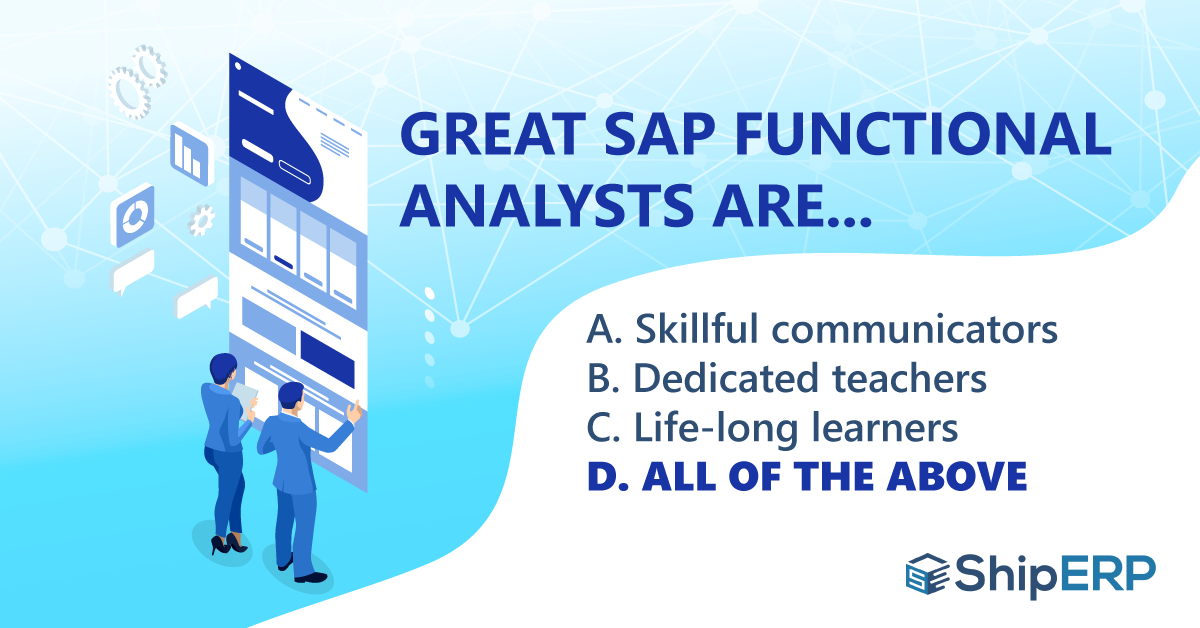
5 Traits Your SAP Functional Analyst Must Have
Are you working on a new initiative involving SAP? If so, then you may want to work with an SAP functional analyst who is dedicated and enthusiastic. He/she will take on your next SAP project.
It’s not every day that you need an SAP functional analyst to help your company. When you do, however, there are some things you should keep a lookout for to have a seamless experience.
What Does an SAP Functional Analyst Do?
Before we can get into what traits your functional analyst should have, let’s talk about their base requirements. The short version of an SAP functional analyst’s role is to use his or her knowledge of SAP software to make sure your business runs efficiently. SAP functional analysts ensure the smooth integration of new initiatives by acting as the bridge between your business and the technology.
In order to succeed, they must have a strong technical background to carry out their roles and bring your company the most value. A functional analyst commits a lot of time to understand your business goals, plan, execute, and support your company throughout the implementation process.
The methodology of SAP functional analysts involves five phases:
- Project Planning – Define business goals & objectives and organize project logistics
- Business Blueprint – Gather business requirements and perform a gap analysis
- Realization – Configuring systems and software to fit business requirements
- Final Preparation – Testing the system to resolve all critical open issues and conducting end-users training
- Go Live & Support – Ensure smooth system performance by monitoring and providing feedback
With an SAP functional analyst working so closely on your project for the benefit of your company, you’ll notice traits that make them either a good SAP functional analyst, or one that needs improvement.
Traits That Top SAP Functional Analysts Have
There are many traits an SAP functional analyst should have to ensure that your company has an easy experience integrating and adapting to new processes.
Clear Communication Skills
Communication is a vital attribute for anyone, but it’s especially so when a functional analyst needs to communicate technical knowledge to people of various business functions who may not have the same background. SAP solutions drive business processes, so analysts need to understand the purpose of SAP reports, transactions, and enhancements to fully communicate that to their clients.
In addition to verbal, written communication is equally as important. Functional analysts must create business blueprints, functional and technical specifications, end-users’ training manual, and much more. These documents must be easy to read and understand when the analyst isn’t around to explain everything verbally.
Willingness to Teach Others
A lot of a functional analyst’s role during the project involves working with several members of your team and other stakeholders affected by the project. The analyst will undoubtedly spend time teaching other people about SAP and other solutions. Teaching ends up being a part of an analyst’s job, so the patience and a willingness to teach will make your company’s experience well off with the mentorship. Passing along skills and knowledge is professional development for your own team, especially when your company receives valuable resources like an end-users' training manual.
Strong Focus on Solution Quality
Functional analysts should be agile with their work processes to not waste the company’s time with options that may or may not fit. The analysts perform a gap analysis to offer the best fitting solution and help facilitate change for the company. With a strong focus on quality and attention to detail, your company is sure to reap the benefits of a fully customized solution. It can take a lot of hours to get the work done, but the extra hours spent on blueprinting and configuring ensures a better-quality SAP solution.
Enthusiastic Support
Issues with the system will come up and it’s important for a functional analyst to not get frustrated. Being positive will give the client a good experience, and that experience goes a long way when it comes to building trust. People remember those who helped them, which may help an SAP functional analyst in the long run. Even after the integration process, a functional analyst provides technical support when the solution goes live to solve any problems that may arise.
Dedication to Learning
In addition to teaching others, a functional analyst must be open to learning about new solutions, tools, and processes. Because this role requires an in-depth knowledge of SAP, a functional analyst needs to brush up on their skills every so often. Functional analysts must adapt to new ideas and trends as time passes in the SAP landscape. Technology waits for no one, and it’s an analyst's job to keep up with new skills and tools.
Now it’s your turn to reflect:
- Do you pay close attention to your work with an SAP functional analyst?
- Do these traits positively influence your integration experience?
